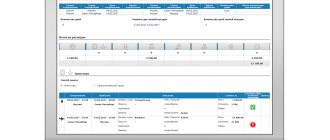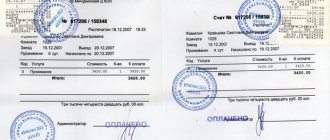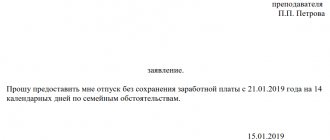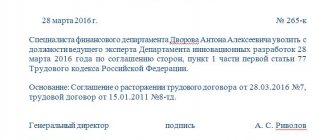Business trip ahead of time - how the accounting department can pay for accommodation and travel
The employer needs to adjust the start date of the business trip by issuing a new order and indicating the valid date of departure on the business trip
. 09.30.2019Russian tax portal
Answer prepared by:
Expert of the Legal Consulting Service GARANT
Suleymanov Marat
The answer has passed quality control
The employee went on a business trip a day earlier than the date indicated in the order as the first day of the business trip, and the hotel reservation was also made a day earlier due to the fact that, in accordance with the internal rules of the hotel, reservations must be made one day before the actual entry. Documents for payment have been submitted.
How can the accounting department pay for accommodation and travel?
How to act without violating the law and avoid punishment during inspections?
Having considered the issue, we came to the following conclusion:
To avoid disputes with regulatory authorities, the employer must adjust the start date of the business trip by issuing a new order and indicating the actual date of departure on the business trip. It is advisable to attach to the amended order a statement or explanatory note from the employee about the need for premature departure on a business trip related to booking a hotel one day before check-in. The explanatory note must reflect that the employee went on a business trip and made the accommodation reservation a day earlier than the original date, not of his own free will, but out of necessity. In this case, the employer has the right to independently obtain information from the hotel that, in accordance with their internal rules, they make reservations one day in advance. Also, in our opinion, for the fact of fulfilling labor duties on the day of departure on a business trip, the employee should be paid an additional amount for his work, in addition to the average earnings and daily allowance.
Rationale for the conclusion:
The procedure for sending employees on business trips, as well as the procedure for providing guarantees and compensation in connection with business trips, are established by the norms of the Labor Code of the Russian Federation and the Regulations on the specifics of sending employees on business trips, approved by Decree of the Government of the Russian Federation of October 13, 2008 N 749 (hereinafter referred to as the Regulations).
By virtue of clause 4 of the Regulations, the duration of the business trip is determined by the employer independently, taking into account the volume, complexity and other features of the official assignment. Moreover, within the meaning of clause 7 of the Regulations, the time of a business trip consists of the actual time spent at the place of business trip and the time the posted worker is on the road, since according to this norm, the actual time the employee is on a business trip is determined by travel documents presented by the employee upon returning from a business trip.
According to clause 4 of the Regulations, the day of departure on a business trip is the date of departure of a train, plane, bus or other vehicle from the place of permanent work of the business traveler, and the day of arrival from a business trip is the date of arrival of the specified vehicle at the place of permanent work. When a vehicle is sent before 24 hours inclusive, the day of departure for a business trip is considered the current day, and from 00 hours and later - the next day. The day the employee arrives at his place of permanent work is determined similarly.
Thus, when determining the duration of a business trip in an order, the employer, as required by paragraph 4 of the Regulations, must also take into account the circumstances associated with the fact of purchasing a ticket for the trip, and, consequently, with the fact of booking housing for the employee. And if it was not possible to purchase a ticket for the date specified in the order, in order to avoid disputes with regulatory authorities, the employer must adjust the start date of the business trip by issuing a new order and indicating the valid date of departure on the business trip.
Due to the fact that in the situation under consideration, the change in the duration of the business trip will be carried out not before the business trip, but “after the fact”, it is advisable to attach to the amended order a statement or explanatory note from the employee about the need for early departure on a business trip related to booking a hotel one day before check-in. The explanatory note must detail all the reasons why the employee was forced to go on a business trip and book accommodation earlier than the original date. In this case, the employer has the right to independently obtain information from the hotel that, in accordance with their internal rules, they make reservations one day in advance.
In accordance with clause 4 of the Regulations, the issue of an employee’s attendance at work on the day of going on a business trip is resolved by agreement with the employer. Within the meaning of the Regulations, an employee may, but is not required to, work at his permanent place of work on the day of departure on a business trip. However, in any case, regardless of whether he worked or not, he is paid the average salary and daily allowance for days such as days on the road (clauses 9 and 11 of the Regulations). After all, additional expenses in the form of daily allowance arise in connection with the very fact of being on the road, and the average earnings are maintained if the day of travel coincides with a working day according to the schedule of the sending organization (see letter of the Ministry of Labor and Social Protection of the Russian Federation dated 09/05/2013 N 14- 2/3044898-4415).
At the same time, the general norms of the Labor Code of the Russian Federation (Articles 2, 3, 15, 21, 22, 132 and others) require that any work be paid. In our opinion, this means that for the fact of performing work duties on the day of departure on a business trip, the employee must be paid an additional amount, in addition to the average salary and daily allowance. Since engaging an employee to work on the day of departure and arrival from a business trip is possible only by agreement of the parties to the labor relationship, the issue of wages on these days should be resolved by agreement between the employee and the employer.
As for the correct reflection of the situation set out in the question in the working time sheet, we note that by virtue of part four of Art. 91 of the Labor Code of the Russian Federation, in the case when an employee worked on the day of going on a business trip, the time sheet must reflect the hours actually worked by him.
State institutions use timesheet form 0504421 (hereinafter also referred to as the Timesheet), approved by Order of the Ministry of Finance of Russia dated March 30, 2015 No. 52n (hereinafter referred to as Order No. 52n) to record the use of working time. According to the Guidelines for the use and completion of forms of primary accounting documents..., approved by the same order (Appendix No. 5 to Order No. 52n), cases of sending an employee on a business trip are also recorded in the Report Card.
In this regard, it should be borne in mind that the Methodological Instructions provide for the right of the subject of accounting to include additional details (data) in the primary (consolidated) accounting document generated on the basis of a unified document form. This means that the employer, in order to reflect in the Timesheet both the employee’s hours of work and the fact that he was sent on a business trip on the same day, can increase the number of columns contained in it.
Thus, if an employee on the day of departure on a business trip was involved in work in the sending organization, in the first column of the working time sheet, as usual, the business trip code is entered without indicating the number of hours in the bottom line, and in the second - the code “F” and the duration of work in day of departure on a business trip in hours.
Post:
Comments
Payments for one-day business trips instead of daily allowances
The legislation indicates that the maximum and minimum periods for a citizen to stay on a business trip are not specified. This suggests that the management task] can be completed by a person in one day[/anchor]. The rules indicate the need to comply with all conditions inherent in long business trips.
This also applies to the rules according to which information is reflected in the documentation of accounting values. The person is charged with the obligation to provide a report on the activities carried out. The important point is what the law says about non-payment of daily allowances. In order not to leave a person without funds, a company can use several options:
- payment of travel allowance calculated per day;
- providing a certain amount of payment, which is called financial assistance.
You should take into account the maximum amounts that apply when assigning daily allowances when a person travels to another country. This limit is equal to half the amount prescribed in the local regulations for situations when a person is sent to another country for a long time.
According to the Labor Code of the Russian Federation, such payments are not applied. Only if the company allocates money on its own.
An employee returns to work on the day he returns from a business trip: is it necessary to pay per diem?
Rostrud experts explained how the day an employee returns from a business trip is paid if he goes to work on that day.
The agency notes that if an employee returns to work on the day of his return from a business trip, he must be paid wages. The employer is also obliged to pay the employee daily allowance for this day.
Rostrud explains that daily allowances are reimbursed to the employee for each day he is on a business trip, including weekends and non-working holidays, as well as days en route, including during a forced stopover.
The day of departure on a business trip is the date of departure of a train, plane, bus or other vehicle from the place of permanent work of the business traveler, and the day of arrival from a business trip is the date of arrival of the specified vehicle at the place of permanent work.
When a vehicle is sent before 24 hours inclusive, the day of departure for a business trip is considered the current day, and from 00 hours and later - the next day. If a station, pier or airport is located outside a populated area, the time required to travel to the station, pier or airport is taken into account.
The day of the employee’s arrival at his place of permanent work is determined in a similar manner.
The issue of an employee’s attendance at work on the day of departure on a business trip and on the day of arrival from a business trip is resolved by agreement with the employer.
Rostrud provides such explanations on its website, answering questions from workers and employers.
BUKHPROSVET
When an employee is sent on a business trip, he is guaranteed to retain his job, average earnings, as well as reimbursement of expenses associated with the business trip. Earnings are retained for all days of work according to the schedule established by the sending organization. During a business trip, an employee working part-time retains the average salary from the employer who sent him on a business trip.
The actual length of stay on a business trip is determined by travel documents. If the employee travels by official or personal transport, the actual length of stay at the place of business trip is indicated in the memo. The note should be accompanied by a waybill, route sheet, invoices, receipts, cash receipts and other documents confirming the transport route.
Upon returning from a business trip, the employee is obliged, within 3 working days, to submit to the employer an advance report on the amounts spent in connection with the business trip and make a final payment for the cash advance issued to him before leaving for the business trip for travel expenses. Documents on the rental of accommodation, actual travel expenses and other expenses associated with the business trip are attached to the advance report.
Start and end days of the business trip
Has it ever happened to you that you wake up in the middle of the night because you have a question in your head, have you filled out the documents correctly for a business trip for an employee, or have you had a dream that your boss is shouting at you and in the midst of all this you catch the essence that you the documents were completed incorrectly. So how can you avoid this and sleep peacefully at night?
What is a business trip in principle?
A business trip (hereinafter referred to as a business trip) is a trip by an employee, by order of the employer, to another location for a certain period of time to perform a work assignment outside the place of his permanent work.
Travel dates:
A business trip is a trip for a certain period of time. During this period, the posted employee must complete a job assignment. The deadline for completing the task is determined by the employer and indicated in the travel order.
At the same time, in order to achieve the set goals, it includes:
- reimbursement of living expenses for the period from the date of the employee’s arrival at the place of business trip to the date of departure from the business trip point;
- payment of daily allowances for the period of stay on a business trip, including travel time
Business trips do not include official trips of employees:
- within the locality where the employer is located.
Example:
an employee of one of the Minsk organizations is sent to perform a job assignment in another organization, also located in Minsk. At the same time, he demanded that this trip be registered as a business trip. The employee justified his demand by saying that the organization is located on the other side of the city and he would have to spend the whole day completing the official task. In this situation, the employee’s demand is unreasonable. The trip will not be a business trip, since it is carried out within the same locality, the distance between organizations in this case does not matter;
- whose permanent work takes place on the road or is of a traveling or mobile nature.
Example:
a company car driver works for an organization. He has been assigned a traveling nature of work. The employee’s job responsibilities include driving a car, transporting the organization’s employees, delivering documents to the organization’s partners, etc. The driver is on the road almost the entire working day. In this case, these trips are not business trips.
Determining the start date of the business trip
This issue is regulated by Article 93 of the Labor Code of the Republic of Belarus (hereinafter referred to as the Labor Code).
The first day of a business trip is the day the employee departs for the place of business trip and it is formalized by order. That is, this is the day of departure (departure) of a train, plane, bus or other transport from the place of permanent work of the business traveler. If the transport leaves before 24:00, then the first day of the business trip will be the current day, and if after (for example, at 00:01) - then the next one. If an employee travels to a business trip by passenger transport, the first day of the business trip will be the day of departure of the vehicle indicated on the travel ticket. In practice, a situation may arise when the departure of a vehicle is delayed for reasons beyond the employee’s control. Accordingly, the actual day of departure does not coincide with the information indicated on the travel ticket.
Example:
The employee has purchased a plane ticket. Departure time is 06/19/2019 at 22:30. There was a delay in the flight, as a result of which the employee flew to the place of business on 06/20/2019 at 02:15. The start of the business trip is 06/19/2019.
If the employee travels in a personal car (or a car provided by the organization), there will be no travel document. The employer indicates the day of departure of this transport in the order.
On a note
To use an employee’s personal car, an agreement on this must be formalized between the employee and the employer. (More on this)
If the day of departure on a business trip falls on a weekend, then the first day of the business trip is considered to be this weekend. In this case, the work time sheet indicates the symbol not of a weekend, but of a business trip day. Let us note that Art. 137 of the Labor Code does not provide for compensation to an employee for the day of going on a business trip that falls on a day off, if on that day the employee does not arrive at the place of business trip and does not begin performing the task.
Example 1:
The employee goes on a business trip on Sunday. He will arrive at his place of business on Monday. Despite the fact that Sunday is a day off (both at the place of permanent work and at the place of business trip), the first day of the business trip will be Sunday. At the same time, formalize the engagement of the employee to work on a day off and make payment for labor and additional payment according to Art. 69 TC is not required.
Example 2:
The employee is sent on a two-day business trip (Saturday and Sunday). At the place of business assignment, these days are weekends, but the employee will perform the task during this period. In this case, it is necessary to formalize the engagement of the employee to work on a day off and make payment for labor and additional payment according to Art. 69 TK.
Continuing our article:
- Do you want to determine the end date of your business trip?
- Want step-by-step instructions for extending a business trip?
- What is a job assignment?
- How to obtain a travel permit?
Buy the paid section and read with interest!
If a business trip starts in one month and ends in another
If a business trip begins in one month and ends in another, then in the 1C: ZUP 3 program there are two options for paying for it:
- payment for the entire period of the trip at once in full. In this case, payment is fully calculated in the Business Trip ;
- monthly payment. In the case of monthly payment, payment is immediately accrued only for the month the business trip began; this occurs in the Business Trip . Payment based on the average for the next month/months of the business trip period is calculated automatically when calculating salaries for the month - in the documents Calculation of salaries and contributions .
The option is selected in the Business trip using the switch Payment for a long business trip :
For example, if an employee is sent on a business trip for the period from June 28 to July 12, and the monthly payment option is selected, then in the Business Trip payment is accrued only for the period from June 28 to June 30:
Payment for the period from 01.07 to 12.07 is calculated when calculating salaries for July.
In this case, the same average earnings are used that were calculated in the Business Trip .
Typically, in practice, a monthly payment for a business trip is used. In order to use this default travel payment option, i.e. so that when creating a document, the option Pay for a business trip at the end of each month , it is necessary that in the settings for the composition of accruals and deductions (Settings - Salary calculation - Setting up the composition of accruals and deductions) on the Absence accounting , the Long business trips should be paid monthly checkbox is selected :
How is travel time paid?
According to Article 167 of the Labor Code of the Russian Federation, payment for a business trip is made according to the average daily earnings for each day of absence from the workplace. Average daily income is calculated for the calendar year preceding the time of the business trip.
Calculation of payment for business trip days
If the employee has worked for less than a year, the average earnings for the time actually worked before the business trip are determined, even if this time is several days.
Having determined the billing period, the accountant removes from it those payments that the employee received while not working: disability benefits, vacation pay, days of downtime due to the fault of the employer, maternity leave, etc.
In other words, to calculate average earnings, only the income received for the time actually worked is taken into account.
As a result, in order to obtain the average daily earnings, payments received in the billing period for the time actually worked are divided by the number of days worked in the billing period.
By multiplying the resulting average daily earnings by the number of days of business trip, the earnings of the business traveler during the period of carrying out an official assignment outside the main place of work are determined.
By the way, how to calculate the average daily earnings for vacation pay, read https://otdelkadrov.online/7012-iz-chego-skladyvaetsya-srednii-zarabotok-dlya-vyplaty-otpusknyh
If the average daily earnings exceed the usual daily earnings, the calculation of payment for business trips is based on the daily average.
If the average daily wage is lower than the usual daily wage, the issue of payment at a higher value is resolved by local management orders, as a rule, in favor of the employee.
Calculation of daily allowances
Daily allowances are funds paid to a business traveler for reasons of their sufficiency to meet his needs during the day. Documentary evidence of where the daily allowance was spent is not required. In the Russian Federation in 2021, the daily allowance for business trips within the country is 700 rubles, for foreign business trips - 2,500 rubles .
The Labor Code of the Russian Federation obliges the employer to pay the employee daily allowance for each day of a business trip, including weekends, holidays, days spent on travel, and time of forced delays along the way.
If the business trip is abroad, daily allowances are issued:
- in foreign currency at the exchange rate on the day of issue;
- for the last day of a foreign business trip - at the domestic Russian tariff - 700 rubles.
The last rule is not mandatory, but recommended by the Federal Tax Service, citing the fact that on the last day of the business trip the employee crosses the border of the Russian Federation.
The start of the business trip duration report is the departure day. For example, the plane leaves early on Monday morning and in order to catch it, the employee must leave on Sunday at 22.00 - then this day will be considered the start of the business trip. The employer is obliged to pay for this day. Read more about how daily allowances are calculated on a business trip on our website https://otdelkadrov.online/6783-primer-rascheta-sutochnyh-v-komandirovke-zagranitsu-po-rf
When sending an employee on a business trip abroad, among other expenses, the employer reimburses:
- expenses for obtaining a passport, visa, etc.;
- mandatory consular fees;
- vehicle entry fees;
- costs for obtaining health insurance;
- other necessary payments and fees.
Transport costs, accommodation . Paid upon receipt of travel documents, hotel bills, receipts for baggage fees, etc.
For information on the specifics of formalizing business trips, watch the video:
How are travel allowances calculated and do they include weekends?
We find out how business trips should be paid for.
– Are weekends and travel days included in business travel allowances, and should they be paid by the employer?
First, let's figure out how travel allowances are calculated in general.
First of all, you need to calculate the number of days actually worked in the billing period. The billing period is 12 calendar months before the business trip. If you have worked in this organization for less than a year, then the entire period of your work is taken into account. In this case, sick leave, vacation, other business trips, etc. are excluded from the calculation period. (Article 139 of the Labor Code of the Russian Federation).
Example.
Let's say you have been working for a company for three years, in 2021 you were on vacation for 26 working days and once took sick leave for five working days.
There were a total of 247 working days in 2021. It turns out that in fact, during the billing period you worked
247 - 26 - 5 = 216 days
.
On the topic
When is it more profitable to take a vacation?
3601
Next you need to determine the average earnings for the billing period. This does not include sick leave, vacation pay and other social benefits (clauses 2 and 3 of the Regulations on the specifics of the procedure for calculating average wages).
Example.
Let's assume that your salary is 25,000 rubles per month. In April you took sick leave and received 22,000 rubles. In July, you went on a 14-day vacation and, minus vacation pay, received 11,360 rubles. In August and October, you took weekly vacations (the number of working days in 2021 in August and October is the same - 23) and received 19,566 rubles each (again, minus vacation pay).
It turns out that during the billing period you received
25,000 x 8 + 22,000 + 11,360 + 19,566 x 2 = 272,492 rubles
.
In this case, your average daily earnings in 2021 was
272,492 / 216 = 1,261.5 rubles.
Now you can decide on the amount of travel allowance: you just need to multiply your average daily earnings by the number of days of your business trip. If you go on a business trip for three days, you must be paid
1,261.5 x 3 = 3,784.5 rub.
Keep in mind that travel days are also included in business travel.
It is also worth noting that if, due to a business trip, your salary turns out to be significantly less than the average earnings, then the employer can pay you up to your actual earnings.
But if your business trip falls on a weekend, then they are paid according to the general principle (Article 153 of the Labor Code of the Russian Federation). That is, if you did not work on these days, then they should not be paid. If you devoted the weekend to work or were on the road, then they are paid at least double the amount or single amount, but with the right to take an additional day off later.
On this topic
What payments are due for the first child in 2021?
7095
In addition, for each day of a business trip, including weekends, travel time and forced stops, daily allowances are paid (Regulations on the specifics of sending employees on business trips). At the same time, you do not have to report on the expenditure of daily allowances - their amount is established by the employer and enshrined in the collective agreement or local regulations (Article 168 of the Labor Code).
Clause 3 art. 217 of the Tax Code of the Russian Federation establishes the maximum amount of daily allowance from which you do not need to pay personal income tax - this is 700 rubles for trips within Russia and 2,500 rubles for trips abroad. This does not mean that they cannot give you more. They can, just if the employer sets the daily allowance, for example, at 1000 rubles, then from the remaining 300 rubles. you will need to pay income tax.
Briefly about the main thing:
1. The amount of travel allowance is calculated based on the average daily earnings for the days actually worked in the billing period.
2. Sick leave, vacations, business trips, etc. are excluded from the billing period.
3. If, due to a business trip, your salary turns out to be significantly less than the average, the employer can pay you extra up to your actual earnings.
4. Weekends on a business trip are paid according to the general rule: double or single with the right to take time off later if you worked, and not paid if you did not work.
5. For each day of your business trip, you must be paid a daily allowance, which is established by the employer and enshrined in a collective agreement or local regulation.
If you have questions that you can't find the answer to, ask us and we will try to answer them.
On this topic
17880
How often should a gas stove be checked?
Who determines the duration of a business trip and by what criteria?
The duration of a business trip can be as long as necessary for the employer to effectively complete the production task.
During the Soviet era, the procedure for sending workers on business trips was established by orders of the relevant ministries. There was Instruction No. 62 of the Ministry of Finance, the State Committee for Labor and the All-Russian Central Council of Trade Unions of the USSR, which regulated the actions of enterprise managers in terms of orders based on such a criterion as the duration of a business trip. In accordance with this document, directors of factories and organizations had the right to set a deadline for completing tasks outside the enterprise of no more than 40 days, excluding travel time there and back.
For workers involved in installation, commissioning and construction work, the travel period could be extended to a year.
Longer business trips were approved by ministries. These rules were in force in the country until the adoption of Resolution of the Russian Federation of October 13, 2008 No. 749. This normative act approved the “Regulations on the specifics of sending employees on business trips.” According to clause 4 of the “Regulations”, the decision on the duration of a business trip is made by the head of the organization, guided by considerations of production and other needs, the complexity of the work ahead, etc. Therefore, the maximum period of stay on a business trip can be any, that is, unlimited.
The employer has the right to use the provisions of Instruction No. 62 at the present time, if they do not contradict the Labor Code of the Russian Federation. Since the Labor Code does not regulate the minimum and maximum duration of a business trip, the employer has the right to adhere to paragraph 2 of the Instructions, which establishes the minimum duration of a business trip - 24 hours . If the employee completed the task and returned to the main place of work on the same day, a travel certificate is not issued.
Example of daily allowance calculation
Citizen Ivanov was sent on a business trip to the city of N. for the period from 09/03/2019 to 09/06/2019. Moreover, if we take into account the time spent by the person on the flight, the duration of the specified period will increase by a couple of days.
In this case, employees of the financial department are responsible for calculating payments for all specified days. If, based on the average calculation, it turns out that the payment per day is 800 rubles, then throughout the entire business trip Ivanov received 4,800 rubles.









